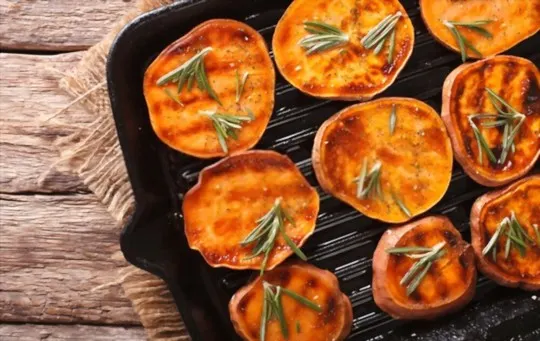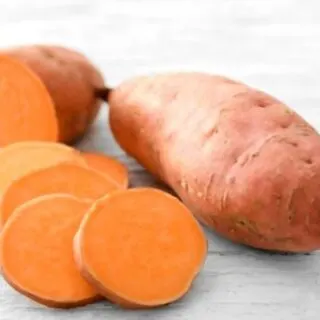Have you ever been left wondering, “Do sweet potatoes go bad? How long should I keep them in my pantry or fridge before they spoil?”
If this is something that has crossed your mind, fear not – you are not alone.
With their creamy texture and sweet taste, sweet potatoes have become a favorite for many home cooks; however, the shelf-life of these much-loved vegetables isn’t always clear.
In this blog post, we will explore how long sweet potatoes last so that you can enjoy them at their best each time!
We’ll also take a look at whether it’s better to store them in the refrigerator or somewhere else like a dark cupboard – plus helpful facts about prepping and cooking your spuds.
What’s Sweet Potato?

Sweet potatoes are a type of tuber that is often confused with yams.
They are, however, two entirely different vegetables.
Sweet potatoes have smooth, reddish-brown skin and orange flesh.
They are also sweeter and less starchy than yams.
Yams, on the other hand, have rough, dark brown skin and white, yellow, or purple flesh.
They are also starchier than sweet potatoes.
Sweet potatoes are a good source of fiber, vitamins A and C, and potassium.
They can be eaten cooked or roasted.
Yams, on the other hand, are a good source of vitamins C and B6, as well as potassium and manganese.
Yams can be boiled, baked, or mashed.
So the next time you’re at the grocery store looking for sweet potatoes, make sure to grab the right vegetable.
How to Store Sweet Potatoes?
One of the best ways to store sweet potatoes is by curing them.
Curing sweet potatoes helps to improve their flavor and texture, and it also makes them last longer.
To cure sweet potatoes, you will need to place them in a cool, dark place for about 10 days.
During this time, the sweet potatoes will develop a thicker skin that will help to protect them from damage.
After curing, you can store sweet potatoes in a cool, dark place for up to six months.
Ideally, you should store them in a temperature-controlled environment like a root cellar or basement.
If you do not have access to a temperature-controlled environment, you can store sweet potatoes in a cool pantry or cupboard.
Just make sure that they are not stored near any sources of heat, as this can cause them to spoil more quickly.
When it comes time to use your stored sweet potatoes, simply wash them off with water and then cook them as desired.
You can bake, boil, or fry sweet potatoes, and they make a delicious addition to any meal.
How Long Do Sweet Potatoes Last?

Sweet potatoes are a type of starchy root vegetable that can last for several weeks when stored properly.
They’re often used in pies, casseroles, and other dishes.
Sweet potatoes are a good source of fiber, vitamins A and C, and potassium.
Sweet potatoes should be stored in a cool, dark place such as a pantry or cupboard.
They can also be stored in the refrigerator, but this will cause them to spoil faster.
Sweet potatoes can last anywhere from two to four weeks when stored properly.
If you notice that your sweet potatoes have started to sprout or they’ve developed soft spots, it’s best to throw them out.
Eating spoiled sweet potatoes can cause food poisoning.
When it comes to storing sweet potatoes, it’s important to keep them in a cool, dark place.
This will help them last longer and prevent them from spoiling.
If you need to store sweet potatoes for more than a few days, the refrigerator is your best bet.
Can You Freeze Sweet Potatoes?
You may be wondering if you can freeze sweet potatoes.
The answer is yes, you can.
Freezing sweet potatoes is a great way to preserve them so that you can enjoy them all year long.
Here are some tips for freezing sweet potatoes:
- Choose fresh, firm sweet potatoes that are free from blemishes or bruises.
- Wash the sweet potatoes thoroughly and peel them if desired.
- Cut the sweet potatoes into uniform pieces, slices, or chunks.
- Blanch the sweet potatoes by boiling them for 3-5 minutes.
- Shock the sweet potatoes in ice water to stop the cooking process.
- Drain the sweet potatoes and pat them dry with a towel.
- Place the sweet potatoes on a baking sheet and freeze for 2-3 hours.
- Once frozen, transfer the sweet potatoes to a freezer bag or container.
- Label the bag or container with the date and contents.
- Store in the freezer for up to 12 months.
How to Tell If Sweet Potatoes are Bad?

It’s easy to tell if sweet potatoes have gone bad.
Simply take a look at them and if they have any mold on them, throw them away.
If they’re starting to sprout, that’s another sign that they’ve gone bad and you should get rid of them.
Sweet potatoes that are beginning to shrivel up are also no longer good to eat.
If your sweet potatoes don’t have any visible signs of being bad, you can still test them before cooking or eating them.
Cut off a small piece of the sweet potato and try frying it or baking it.
If it doesn’t taste right or if it’s mushy, those are both signs that the sweet potato has gone bad.
Ultimately, the best way to tell if a sweet potato has gone bad is to use your common sense.
If it doesn’t look or smell right, it probably isn’t good to eat. When in doubt, throw it out.
Conclusion
We’ve gone over how long sweet potatoes last and if they go bad.
Sweet potatoes can last for a couple of weeks or even up to a few months if they’re stored properly.
You can tell if they’re bad if they’ve started to sprout or if they’ve turned mushy.
If you’re ever in doubt, it’s best to throw them out.
That being said, sweet potatoes are a great food to have on hand and can be a healthy addition to your diet.
Thanks for reading and we hope this post was helpful.

How Long Do Sweet Potatoes Last? Do They Go Bad?
Ingredients
- Sweet potatoes
- Air-tight containers or Ziplock bags
- Labels and markers
Instructions
- Store your product in an labelled container in a cool, dark place like the pantry or fridge.
- If your food is frozen, allow it to thaw in the fridge before cooking.
- Make sure to look for signs that your food has gone bad before eating it.

Carrie is a food writer and editor with more than 15 years of experience. She has worked for some of the biggest names in the food industry, including Bon Appétit, Food & Wine, and Martha Stewart Living.
As the Editor in Chief of IntroChicago.com, Carrie oversees all of the content on the site. She also manages the team of contributing writers and editors, who help to create delicious recipes, helpful tips, and informative articles that you’ll find on the site.
A native of the Chicago area, Carrie is passionate about all things food. She loves trying new restaurants and experimenting with new recipes in her kitchen. She’s also a graduate of the Culinary Institute of America, so she knows a thing or two about food!
